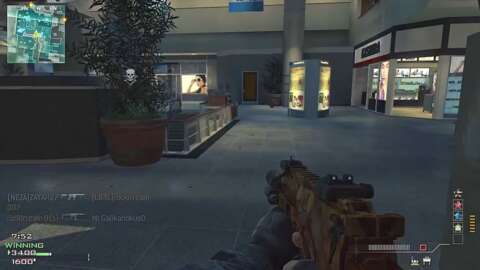No, Your Call Of Duty Matchmaking Conspiracy Theory Isn't True, Activision Insists
Activision discusses one of Call of Duty's hottest topics in its latest blog post.
One of the biggest topics often surrounding Call of Duty is the matchmaking experience, and Activision has released a new blog post to discuss all the factors that weigh into matchmaking for the game's multiplayer mode.
In a debate that's old as time, Call of Duty is often criticized for having "high SBMM," with skill-based matchmaking that's meant to match up players in lobbies with similarly skilled players, but this latest blog refutes that skill is the dominant factor.
The publisher says, "We often see the community refer to our matchmaking system as skill-based matchmaking. Call of Duty does consider skill (or more specifically player performance) as a component, as do most in the industry, but skill is not the dominant variable. We consider and prioritize several factors to create lobbies."
The given factors are said to include connection, matchmaking start times, playlist diversity, recent maps and modes, skill/performance, input devices, platforms, and whether a player's voice chat is enabled or disabled.
"Every time a player begins matchmaking in multiplayer," the publisher explains, "the process needs to work through all these factors to find other players (all of which are also being analyzed) to quickly assemble a lobby that is stable and competitive."
The blog also looks to debunk some community theories, as it specifically states that hit registration, damage-based, or aim assist-based factors do not affect matchmaking in any way.
Purchasing store bundles also does not affect the game's matchmaking in any way. In the past, some players have claimed that matchmaking directs you into matches with those using expensive cosmetics, in the hopes that you'll be encouraged to also spend money on microtransactions, but the blog clarifies that "money spent does not in any way, shape or form, factor into matchmaking."
When discussing the skill factor, Activision says the skill is determined based on a player's overall performance, including kills, deaths, wins, losses, mode selection, and recent matches as an overall metric across multiplayer. "Skill is not only a factor in matchmaking players against appropriate enemies, but also when finding teammates."
Part of the need for skill factors in matchmaking is attributed to Call of Duty's data showing that it keeps the matchmaking ecosystem healthier. The blog explains that when lower skill players are consistently on the losing end, data shows they're more likely to quit matches in progress or stop playing altogether.
While this new transparency probably won't provide much relief for players who fall victim to the sweatiest lobbies, Activision acknowledges the complaints of the high-skill players who want more variety in their multiplayer experience, saying, "We have heard this feedback clearly and will continue to test and actively explore ways to mitigate this concern."
Activision says this blog is meant to be the start of an ongoing conversation around the topic of matchmaking, with new details for Warzone and Ranked Play arriving at a later date.
In other Call of Duty news, Warzone streamers revealed that the fan-favorite Fortune's Keep Resurgence map would return sometime in Season 2. Season 2 of Modern Warfare 3 and Warzone launches on February 7, and here's everything rumored and announced for the big update.
Got a news tip or want to contact us directly? Email news@gamespot.com







Join the conversation